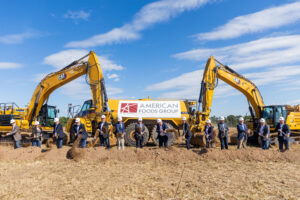Fedex is the the largest employer in Memphis, TN. The company employs roughly 30,000 people in that city, which is nearly double the number of school teachers in Memphis public schools. Over the last few years, food and agriculture startup accelerator programs have multiplied at a fast clip, and continue to do, usually focusing on the farm or at the consumer end. But since logistics — how food gets from the farm to our plate — is just as crucial a part of the food system as the rest, we wanted to speak with an accelerator focusing on it.
EPICenter Memphis is a consortium of accelerators with the mission of creating a vibrant culture of entrepreneurship in Memphis and one of those accelerators is EPICenter Logistics Innovation Accelerator, which is run by Leslie Smith and funded by Fedex.
While the accelerator operates across industries, it has had food industry-focused startups undertake the program. In the first cohort, the program had a secure, over the door cooler to receive perishable deliveries and in the current cohort there’s a startup looking to monetize empty container space in trucks returning to their base. We spoke to Smith to find out how the program got started and which logistics trends entrepreneurs are trying to pick up and run with.
How did the Epicenter logistics accelerator get started?
Fedex is headquartered and was founded here by Memphian Fred Smith. He and his family share this real commitment to investing in and around Memphis, so that it can be the most vibrant and amazing city possible and attract and retain really strong people. So there was this real enthusiasm for entrepreneurial programs that create a more vibrant city. And also, Fedex has an entire team dedicated to innovation who do a great job of carrying forward internal innovation, but needed another channel for identifying innovations outside of their organizational walls. And those two things together sort of spawned into this notion that a Fedex accelerator would accomplish both of those things. That’s when the logistics accelerator was born and now we’re in our third year.
What is the structure of the program?
We give a $50,000 investment to those that are selected to come here. They are here for three months over the summer. The Epicenter brought together all the disparate accelerators in Memphis and now hosts them under a single roof where our partners at StartCo provide all of the fundamental core curriculum that is appropriate for every startup irrespective of industry. And then the accelerators, which are focused on specific industries, have an opportunity to go deeper and wider in those verticals as they grow their companies. They are co-located and co-creating their companies with 20 other teams, only four of which are in the logistics accelerator, but all of which are in the same place in their journey.
In addition to that, we give them deep and wide access to supply chain and logistics companies in Memphis, not the least of which, obviously, is access to senior level executive sponsorship from Fedex. Our teams are all assigned senior level sponsors who become their first real advisor and sit with them throughout the summer experience to help them go through their customer discovery process, connect them to appropriate people within the Fedex family or network of partnerships to continue their evaluations and grow their product or service and really identify the appropriate business model for them.
What are the trends in logistics coming through the accelerator that could affect the transport of food?
I think in logistics there’s a huge amount of conversation about last mile delivery. We get lots of innovation in that space. How do we deliver without consumer intervention in the last mile? We’ve also seen a lot of ideas in the ‘less than load’ market because that’s known as a missed financial opportunity, which is very interesting in food and ag. I drive my load from Memphis to Nashville and then when I drive back I have a less than full trailer. Could we commoditize and sell that available space? We’ve seen one innovation there.
Another one of our companies this year is around game-ification of the truck driver experience. And what is interesting is that its ultimate strategy is about recruitment and retention. Apparently there is about to be huge churn in the truck driver industry. A bunch of truck drivers are going to age out and retire and there is a huge opportunity for whoever holds the list of most qualified safe and engaged drivers in the future.
In our first logistics accelerator we had a sensor play – so how do you maintain temperatures? That innovation came to us out of Cleveland Clinic. There’s obviously a huge opportunity in driverless flight. We just had a meeting with Fedex not too long ago and one of the things that they have been thinking about and we might focus on in the future is around sustainability, alternative fuels, and energy efficiency.
Are there opportunities in logistics for the sharing economy? Are there Uber-style solutions for the larger capacity vehicles? We’re increasingly trying to get our logistics sponsors and, not just Fedex, but from throughout the entire supply chain to identify very clear and specific pain points so we can call in innovation around those pains.





